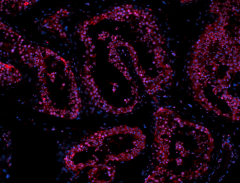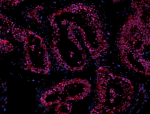- Clone
- A19237B (See other available formats)
- Regulatory Status
- RUO
- Other Names
- Autophagy Related 3
- Isotype
- Mouse IgG2a, κ
- Ave. Rating
- Submit a Review
- Product Citations
- publications

-

Human paraffin-embedded testis tissue slices were prepared with a standard protocol of deparaffination and rehydration. Antigen retrieval was done with citrate buffer 1X pH 6.0 at 95°C for 40 minutes. Tissue was washed with PBS/ 0.05% Tween-20 twice for five minutes, blocked with 5% FBS and 0.2% gelatin for 30 minutes. Then, the tissue was stained with 10 µg/mL of purified anti-human ATG3 (clone A19237B) at 4°C overnight. On the next day, the tissue was washed twice with PBS and stained with Alexa Fluor® 594 goat anti-mouse IgG (clone Poly4053) (red) for two hours at room temperature. The nuclei were counterstained with DAPI (blue). The image was captured with a 10X objective.
| Cat # | Size | Price | Quantity Check Availability | Save | ||
|---|---|---|---|---|---|---|
| 379702 | 100 µg | $288 | ||||
Human autophagy related 3, ATG3, is a 314 amino acid protein with a molecular mass of 36 kD, which is a ubiquitin-like modifier similar to the canonical E2 enzyme. ATG3 is a widely expressed conjugating enzyme for APG8 lipidation, an essential step for the initiation of autophagy. Autophagy is the process of bulk degradation of cellular proteins through an autophagosomic-lysosomal pathway which plays an important role in controlling normal growth but may be defective in tumor cells. ATG3 is essential for autophagocytosis, which is a starvation-induced process responsible for transport of cytoplasmic proteins to the lysosome/vacuole.
Product DetailsProduct Details
- Verified Reactivity
- Human
- Antibody Type
- Monoclonal
- Host Species
- Mouse
- Formulation
- Phosphate-buffered solution, pH 7.2, containing 0.09% sodium azide
- Preparation
- The antibody was purified by affinity chromatography.
- Concentration
- 0.5 mg/mL
- Storage & Handling
- The antibody solution should be stored undiluted between 2°C and 8°C.
- Application
-
IHC-P - Quality tested
- Recommended Usage
-
Each lot of this antibody is quality control tested by formalin-fixed paraffin-embedded immunohistochemical staining. For immunohistochemistry on formalin-fixed paraffin-embedded tissue sections, a concentration range of 5.0 - 10.0 µg/mL is suggested. It is recommended that the reagent be titrated for optimal performance for each application.
- RRID
-
AB_2922609 (BioLegend Cat. No. 379702)
Antigen Details
- Structure
- Human ATG3 is a 314 amino acid protein with a molecular mass of 36 kD
- Distribution
-
Expressed in testis and bone marrow stromal cell
- Function
- E2-conjugating enzyme required for the cytoplasm to vacuole transport (Cvt), autophagy, and mitochondrial homeostasis. Responsible for the E2-like covalent binding of phosphatidylethanolamine to the C-terminal Gly of ATG8-like proteins (GABARAP, GABARAPL1, GABARAPL2, or MAP1LC3A).
- Interaction
- Interacts with ATG7 and ATG12. The complex, composed of ATG3 and ATG7, plays a role in the conjugation of ATG12 to ATG5.
- Ligand/Receptor
- ATG8
- Biology Area
- Cell Biology, Cell Death, Immunology
- Molecular Family
- Apolipoproteins, Autophagosome Markers
- Antigen References
-
- Isei T, et al. 2002. J Biol Chem. 277:13739.
- Silke M. et al. 2009. Hum Genet. 128:453.
- Ozlem O, et al. 2012. Apoptosis. 17:810.
- Gene ID
- 64422 View all products for this Gene ID
- UniProt
- View information about ATG3 on UniProt.org
Other Formats
View All ATG3 Reagents Request Custom Conjugation| Description | Clone | Applications |
|---|---|---|
| Purified anti-human ATG3 | A19237B | IHC-P |
Compare Data Across All Formats
This data display is provided for general comparisons between formats.
Your actual data may vary due to variations in samples, target cells, instruments and their settings, staining conditions, and other factors.
If you need assistance with selecting the best format contact our expert technical support team.
-
Purified anti-human ATG3

Human paraffin-embedded testis tissue slices were prepared w...
 Login/Register
Login/Register 







Follow Us